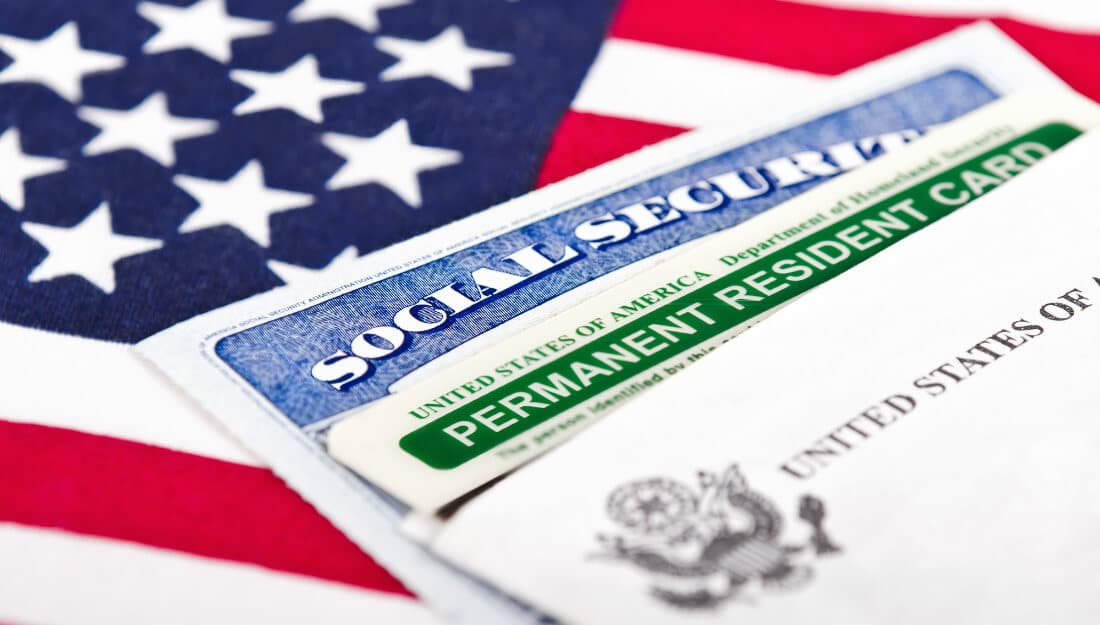Speak to an Immigration Lawyer
Answer the following questions to schedule a free consultation
Answer the following questions to schedule a free consultation
To get started, give us a call during normal business hours and share some basic details about your case.
We’ll listen to your story, understand your goals, and create a legal strategy that aligns with your needs.
Receive top-quality legal representation. We’ll continue fighting until we get you the outcome you deserve.

For decades, the prospect of a better life has motivated people to leave their home country and immigrate to the United States. Whether it’s the pursuit of an economic opportunity, the fear of persecution, or their desire to be closer to family, millions of people obtain legal residence each year and for a wide variety of reasons.
However, gaining legal status in the United States requires a reasonable understanding of immigration law. This process is often thorough and complex, requires many forms and can take some time. For these reasons, many people seek the advice of an experienced immigration lawyer who can guide them through the process.
Becoming a United States citizen is a dream for many people around the world. It offers tremendous rights, freedoms and opportunities that many other countries do not have. In many cases, a person will become a U.S. citizen after being a legal permanent resident and green card holder for at least five years. You can gain citizenship more quickly through birthright, marriage or military service.
Pursuant to the Fourteenth Amendment to the U.S. Constitution, you automatically gain U.S. citizenship if you were born in the United States. Birthright citizenship also applies to children born on international soil to parents who are U.S. citizens (with certain exceptions).

You can immigrate to the United States if you have an immediate family member (such as a parent, child, sibling or spouse) that is a U.S. citizen or permanent resident. In order to gain permanent legal status however, that family member must be willing to sponsor you. To sponsor you, they must be willing to sign an affidavit of support. This document provides the U.S. Citizenship and Immigration Service (USCIS) with assurance that your family member will financially responsible for you during your residency. An experienced immigration attorney can offer great information on how to prepare an affidavit of support.

In order to become a new citizen, you must undergo a naturalization process which requires you to meet certain criteria. First, you need to obtain a “green card,” which gives you permission to live in the United States on a permanent basis. You must hold this green card for five years, unless you are married to a U.S. citizen. In that case, the minimum holding period runs three years. You must also demonstrate basic knowledge of U.S. history, the Constitution and the operation of the government. The USCIS administers a naturalization test to reveal how much you understand these topics and whether you can communicate in English.
Certain applicants do not have to fully meet these requirements, and an experienced legal professional can help determine if you qualify for an exemption. If you’re eligible, you avoid having to demonstrate English proficiency and you only have to answer 20 of the otherwise 100 civics questions on the test. The USCIS’s website provides numerous sources of information on applying for citizenship and resources for test preparation, such as flash cards.

As part of the naturalization process, you must also show that you have good moral character during the minimum residency requirement. Thus, a criminal conviction may cause your application to be denied and may ultimately lead to deportation. If you have been charged with a crime, it would be best to schedule a consultation with an immigration attorney or a criminal lawyer who specializes in immigration law. Provide the lawyer with detailed information about the arrest and charge. Depending on the circumstances, the attorney can obtain a plea bargain or other result that may reduce the chances of your residency status being threatened. If you have received traffic tickets, Federal courts typically will not treat this as evidence of your lack of good moral character unless you failed to pay fines.

In most cases, a foreign national who seeks to enter the U.S. must first acquire a United States visa, which is placed in the traveler’s passport. A United States visa gives an international citizen the ability to travel through a port of entry, airport or border crossing and and stay in the United States for a limited period of time. While there are over 180 different types of U.S. visas, they can be broken down into two main categories:
Nonimmigrant visa – for temporary visits like business trips, vacations, school, employment or family visits
Immigrant visa – for people looking to immigrate to the United States and live there on a permanent basis
There are several types of visas a person can apply for in order to be legally admitted into the United States.
The H1B work visa allows skilled foreign workers to live and work in the United States on a temporary basis. To get an H1B visa, your employer must sponsor you and you must work in a “specialty occupation.” A specialty occupation is one that requires specialized knowledge along with a bachelors degree or higher. Examples include physicians, engineers, architects, and college professors.

If you’re the fiance of a U.S. citizen and plan to live in the United States, you’ll need to apply for a K1 visa. This allows a fiance to enter and marry within 90 days after arrival in the country. Following the marriage, the spouse can then request permanent residency status. In addition to filling the form, you must also present your passport and certificates from police agencies from where you have lived. If the person you plan to wed was previously married, you must also provide certificates of divorce. An experienced immigration lawyer can assist you with completing the K1 application.

If you want to study in the United States but aren’t a U.S. citizen, you’ll need to obtain a student visa. While getting a visa to study in the United States can take some time, it is a rather easy process. American schools and universities continue to be very interested in in broadening their talent pool by welcoming students from around the world. Your field of study and the type of school you plan to attend will determine whether you need an M visa or an F visa.

If you must flee your home country because you have been persecuted or fear persecution due to race, nationality, religion, sexual orientation or political persuasion, you can obtain asylum in the United States. To apply for asylum, you must file a Form I-589, Application for Asylum and for Withholding of Removal, within one year of your arrival. The application covers you and your immediate family, except for children who are age 21 years or older. It’s important to know that not filing it by the deadline or failing to prove the grounds for asylum can subject you to deportation. Keep in mind, the fact that you cannot find work in your home country, while perhaps reasonable grounds for your to leave, does not make you eligible for asylum. If you need residency in the U.S. to escape persecution, contact an immigration law firm to understand all of your options.

An immigrant faces removal from the U.S. upon conviction of many types of crimes. These may include theft, assault, homicides, domestic violence crimes and others which are deemed of “moral turpitude.” Beyond crimes, being in the United States without authority, a fraudulent marriage (that is, one created or arranged to prevent removal from the U.S.) or denial of an application for a visa, permanent residency or asylum can subject you to a deportation hearing.
A top rated immigration attorney can provide affordable representation in deportation proceedings. With the services of an experienced attorney, you can understand how to preserve and advance your rights at various hearings. For example, during a “master hearing,” you provide your name and address to an immigration judge. That official then shares information about the basis for your removal from the country, asks you whether you choose to contest deportation and advises you of your rights to hire an attorney.
If you proceed to a trial, the federal government must prove by clear and convincing evidence the reasons why you should be deported under immigration law. During the trial, your lawyer should put forth his or her best effort in presenting exhibits, witnesses and other evidence to defeat the removal. If you do not prevail, you can appeal to the Board of Immigration Appeals. The decision of that board becomes final, unless a federal court determines that the board either did not make a rational decision or committed an error of law. In some situations, the Attorney General may reverse a deportation decision.

Immigration law is often considered a specialty area. As a result, looking for immigration attorneys in your immediate local area (especially if the community is rural or small) might not reveal many choices. However, online searches can connect you to legal experts in larger cities that handle all types of immigration matters.
By browsing online directories, you can see a comprehensive list the names, phone numbers and addresses of immigration attorneys in your area. Read the reviews from clients and take note of ratings to find out the cost of the lawyers and whether they are experienced in practice before administrative boards or in immigration matters.
If you need affordable advice or representation, search for legal aid or private law firms that take these cases at a lower cost. Some lawyers offer free or very cheap consultations to encourage you to learn your rights and what an experienced expert in immigration matters would recommend in addressing problems with being able to stay in the U.S.
